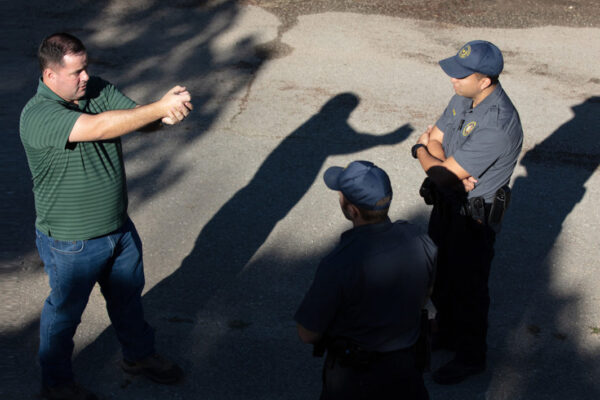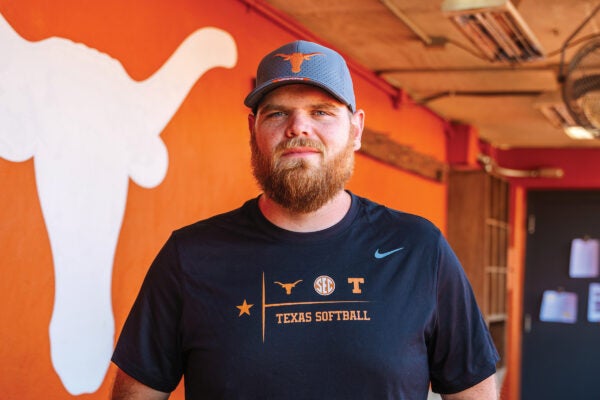Police officers everywhere train to answer a variety of calls. But David Chambers, a University of Texas Police detective, says officers in his department can benefit from one particular area of instruction.
“I think anyone on a college campus — law enforcement especially — should have training with mental health because we interact with it so much,” Chambers says.
UTPD officers go through special training for mental health calls to ensure they are ready to respond to individuals in crisis. The police force, which has an authorized strength of 102, according to Director of Campus Safety Communications Noelle Newton, also prioritizes preparation for sexual assault cases and active shooter scenarios and collaborates with other agencies and campus resources to be ready to provide whatever help is needed.
After earning a master’s degree in higher education and administration, Chambers worked at various colleges before becoming a Philadelphia firefighter and then a hazardous materials technician in Washington. In 2013, he moved back to Texas, his home state, to work as the police department liaison for Student Emergency Services in the Office of the Dean of Students. Three years later, he was recruited to join UTPD.
Chambers is the department’s Crisis Intervention Team (CIT) and Mental Health Officer (MHO) instructor and a member of the Crisis Negotiation Team. Though CIT training is required for all members of law enforcement in Texas, UTPD officers are strongly encouraged to also become MHOs — which requires an additional 40 hours of instruction.
The MHO training shows officers how individuals with mental illness might act and how to approach these types of cases. Officers are taught to be active and empathetic listeners and how to de-escalate situations.
“We’re being called as a police officer,” Chambers says, “but we’re not going to use the tools on our belts. We’re going to use the tools that we’ve learned from interacting with people.”
Most days, the detective focuses on any current or potential threat on campus. But during MHO training, he and his trainees visit mental health hospitals and other services off campus and work with several campus offices, such as the Counseling and Mental Health Center, Student Emergency Services and the Center for Students in Recovery.
Sgt. Samantha Stanford, who joined the UTPD Criminal Investigations Unit in 2016, works with many of these same campus resources. She helped create a sexual assault reporting guide to assist victims.
“Sometimes people just don’t know what to expect when reporting to law enforcement,” Stanford says. “You might think of what’s on TV — that you have a patrol car come up with flashing lights, and then you’re going to be in court on the bench in front of a bunch of people in a few weeks — but it’s not like that.”
Stanford says she originally joined the unit after “an unfortunate situation.” She was at a hospital working with a student for a case, she says, when she overheard officers from another agency poorly handle a conversation with a sexual assault victim.
“It’s not something that I would’ve wanted to hear if I were a victim,” Stanford says. “From there, I opened my eyes, like, ‘Wow, we really need to do better.’”
This mentality is what fueled Stanford to begin — and now continue — working on sex crimes specifically, she says. Every month, she and her unit meet with the Interagency Sexual Assault Team, a local collaboration with different departments in Travis County.
UTPD Public Order Division Sgt. Hector Luevano Jr. works with other agencies at Counter Assault Strike Team trainings. Officers from different departments learn to respond together to large-scale attacks such as an active shooter.
Luevano says the UTPD public order officers are constantly working on rapid-response training — whether it be casualty care or learning the geography of university buildings — because he knows that an incident could happen on campus.
“It’s not necessarily if something can happen,” Luevano says. “Like the saying, ‘You don’t want to fix a leaking roof in the rain. You want to do it when it’s dry.’ That’s how our Public Order Department looks at it.”
Chambers also stresses the importance of being prepared for whatever might come along.
“Throughout my career,” he says, “I’ve always said: ‘I never wish anything bad to happen to anyone. I never want anyone to go through crisis. But if they are, I want to be there to help them out. Because I’m good at what I do.’”




